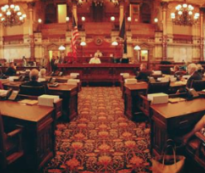TOPEKA, Kan. (AP) — The Latest on the Kansas Legislature’s debate over its budget problems and raising taxes to fix them (all times local):
11:15 a.m.
The Kansas Senate has given first-round approval to a bill that would continue a statewide property tax for public schools for another two years.
Senators advanced the measure Thursday on a voice vote. The bill would raise $635 million for schools during the 2017-18 school year and another $663 million for 2018-19.
The Senate planned to take a final vote Friday to determine whether the bill goes to the House.
Kansas has imposed a statewide property tax to raise money for schools since 1992. The Kansas Supreme Court has said the state constitution prohibits lawmakers from imposing it for more than two years at a time.
The tax is $20 for every $1,000 of a property’s assessed value. The first $20,000 of a home’s value is exempt.
———–
10:30 a.m.
Republicans legislators in Kansas are divided over a proposal to raise additional revenue with a “flat” personal income tax despite GOP Gov. Sam Brownback’s endorsement.
The Republican-controlled Senate was debating an income tax bill Thursday, a day after Brownback said publicly that he would sign it or something similar.
GOP leaders conceded the bill might not pass.
The proposed budget fix would impose a 4.6 percent rate for all filers starting next year. That is the top rate for higher-income earners, and the bill would eliminate the 2.7 percent rate now in place for lower-income filers.
It would end an exemption championed by Brownback for 330,000-plus farmers and business owners.
The measure would raise about $652 million over two years. Kansas faces budget shortfalls totaling more than $1 billion.
———-
TOPEKA, Kan. (AP) — Kansas legislators are preparing to debate a proposal to raise additional revenue with a “flat” personal income tax that has the backing of Republican Gov. Sam Brownback.
The state Senate was taking up an income tax bill Thursday, a day after Brownback said publicly that he would sign it or something similar.
The proposed budget fix would impose a 4.6 percent rate for all filers starting next year. That is the top rate for higher-income earners, and the bill would eliminate the 2.7 percent rate now in place for lower-income filers.
It would end an exemption championed by Brownback for 330,000-plus farmers and business owners.
The bill would raise about $652 million over two years. Kansas faces budget shortfalls totaling more than $1 billion through June 2019.
TOPEKA, Kan. (AP) — Kansas legislators are preparing to debate a proposal to raise additional revenue with a “flat” personal income tax that has the backing of Republican Gov. Sam Brownback.
The state Senate was taking up an income tax bill Thursday, a day after Brownback said publicly that he would sign it or something similar.
The proposed budget fix would impose a 4.6 percent rate for all filers starting next year. That is the top rate for higher-income earners, and the bill would eliminate the 2.7 percent rate now in place for lower-income filers.
It would end an exemption championed by Brownback for 330,000-plus farmers and business owners.
The bill would raise about $652 million over two years. Kansas faces budget shortfalls totaling more than $1 billion through June 2019.
———–
TOPEKA, Kan. (AP) — Kansas Gov. Sam Brownback has endorsed a proposal to use a “flat” personal income tax to raise new revenue to fix the state’s serious budget problems.
The conservative Republican governor said in a statement Wednesday that he would sign a bill like one before the state Senate.
It would impose a 4.6 percent rate for all filers starting next year. That is the top rate for higher-income earners, and the bill would eliminate the 2.7 percent rate now in place for lower-income filers.
The bill would also eliminate an income tax exemption for 330,000-plus farmers and business owners that Brownback has championed.
Critics contend the bill would hit middle-class families hardest. It would raise about $690 million over two years. Kansas faces budget shortfalls totaling more than $1 billion.
